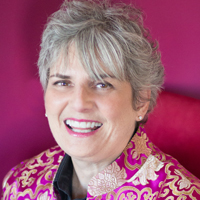
Although broadcaster Larry King left this earth with legions of fans, his seventh wife Shawn may not be among them.
As I write this article, news is breaking that in 2019, Larry handwrote a document requesting that his children be the sole beneficiaries of his funds, removing Shawn. At the time he made this surprise decision, they were divorcing. She is now disputing what appear to be his written wishes.
Should he have told her in advance? I can’t venture to say — but I do recommend more transparency in delicate estate planning situations among my own clients.
This is especially true in close, loving families — where individuals’ well-intentioned decisions can lead to irreparable harm.
After all, in the estate-planning world, money equals love. Leaving one child less money or control than another can haunt them both forever.
Without a personally delivered explanation, adult children may wonder whether their parents cared about or trusted them less than their siblings. Moreover, those chosen to represent their parents’ estate may feel burdened by the commitment.
It’s better when individuals have time to talk with family members while they are alive — no matter how difficult it is to initiate these conversations. This also gives them room to make changes when their decisions will have unexpectedly negative repercussions.
Avoiding Hurt that Lingers
My favorite example of a decision that could have torn a family apart involves parents who were effusive about their love for their children. In the next breath, they said that they wanted one child to get 60% of their estate and the other to receive 40% when they both died.
I was stunned! Usually, an unequal distribution of post-death assets is a signal of some secret discord. In this case, the parents were trying to equalize what their children had already received from them.
The child receiving 60% had chosen to attend public high school and a state college. The sibling with 40% had gone the private route.
“Have you shared this information with your kids?” I asked. “No,” they said, completely nonplussed.
“You should,” I told them. “Without a back story to your distributions, I promise that your children are going to believe that 60% got more love than 40%. Please give them the chance to ask you any and all questions, while you are able to capably answer them.”
They took my advice and were grateful for it.
A Tale of Six Siblings
Here is another cautionary tale: A client with six children owned a lavish second home on Cape Cod, which each of her children loved. In her will, though the client divided all of her assets equally among her six children, she left the Cape house only to her eldest daughter. Why? Because the client’s grandmother had left her summer cottage to all her children, leading to petty sibling arguments and leaving family relationships in tatters.
Unfortunately, that happened here too, despite the client’s best efforts. The daughter who inherited the summer house couldn’t afford the upkeep and repairs, and her siblings did not provide sufficient help. The resulting anger and agony led her to sell the home to strangers, and that transaction broke even more sibling bonds.
If only her mother could have communicated her decision before her death.
The Tip of the Iceberg
These two examples are just the tip of the iceberg. As financial advisors know, there are clients who don’t want their legacy to be a disincentive to their children’s financial independence — so they leave a significant portion to charity, without telling the children. This means children who count on this inheritance may be financially devastated and emotionally distressed.
There are also cases where a parent needs to designate an adult child as a trustee or fiduciary for siblings with addiction or gambling problems, or other special needs.
Recently, I learned of a couple that left the bulk of their estate to the one child whose financial situation was perilous — knowing that the other siblings didn’t need their help. In this case, the bonds between the parents and siblings withstood the test, but they could easily have been frayed.
Mustering the Courage to be Transparent, One Step at a Time
How do I advise clients to talk about their plans so they leave strong family relationships intact? Following are some tips that financial advisors can pass along.
Who: Make a list of whom they should speak with and in what order. This list should include not only the people who will execute and implement the estate plan, but also those who will benefit from or be impacted by it. The more people who know of it, the more effective it will be. Ask these people if they are willing to serve as trustees, personal representatives and agents under durable partner of attorney, and what can be done to make their jobs easier.
Be clear about the reasoning behind decisions that could raise questions, such as choosing the most local child as a healthcare proxy over the child who may have better qualifications, but is living out of state.
What: If clients are leaving money to young children or grandchildren, have they told the parents that they will have to oversee the funds for their children? Do clients’ older children need to incorporate assets into their own estate and tax plans?
Discuss the impact every choice will have on those included in the plan … even consider revealing why. If a client is disinheriting a financially successful child because a slightly larger inheritance left to the other beneficiaries may transform their retirement, they should be transparent about their reasoning to mitigate hurt and confusion.
When: This is important. Set aside a period of time that can be dedicated to focus just on this task. Don’t blend it in with Thanksgiving dinner or a birthday celebration. And consider doing it more than once. Not all questions or concerns will come up during the first chat. Each new discussion will create space for questions, concerns, ideas and love. Don’t initiate the topic after a fight or out of spite.
For example, a client may be providing for a spouse from her second marriage and eventually distributing remaining assets to the children from her first marriage. Everyone should know this is the timeline and they should hear it from the client. The second spouse will rest more easily about the future and the children may not resent their stepparent because they were made aware of this directly and in advance.
Where: Should it be on the phone, via video chat, at home, or in a neutral setting such as an advisor’s office, or even during a walk or a leisurely drive? Wherever it is, ensure that everyone can speak directly to one another and be heard.
How: An estate plan is information that is difficult to deliver and receive. So, acknowledge this and make some rules that may facilitate overcoming challenges. No finger-pointing or name-calling. Wait until a person has finished speaking until the next person speaks. Ensure that each person understands before moving on to the next topic. Do not cling to being right. Stay focused. Allow for time outs so that information can be absorbed and accommodated. Take responsibility. Do not blame. Do not assume. Ask questions and don’t give advice — unless it is requested. And, don’t forget that the genesis of this conversation is love.
Children of parents who refuse to share the details of their plans and assets may find it helpful to create their own estate plans first. The base of knowledge they gain from going through the process will help inform the questions and concerns they should isolate when chatting with their parents.
Finding the courage to discuss these sensitive topics now will prevent shock, anger and embarrassment in the future and preserve positive and warm memories. That’s a good legacy for clients to leave behind, and the whole point of an estate plan.
Estate Planning and Probate Attorney Deborah Danger, Esq., LL.M. (taxation) is the managing member of DangerLaw, LLC, Newton, Mass. Contact her at deborah@dangerlaw.com.







